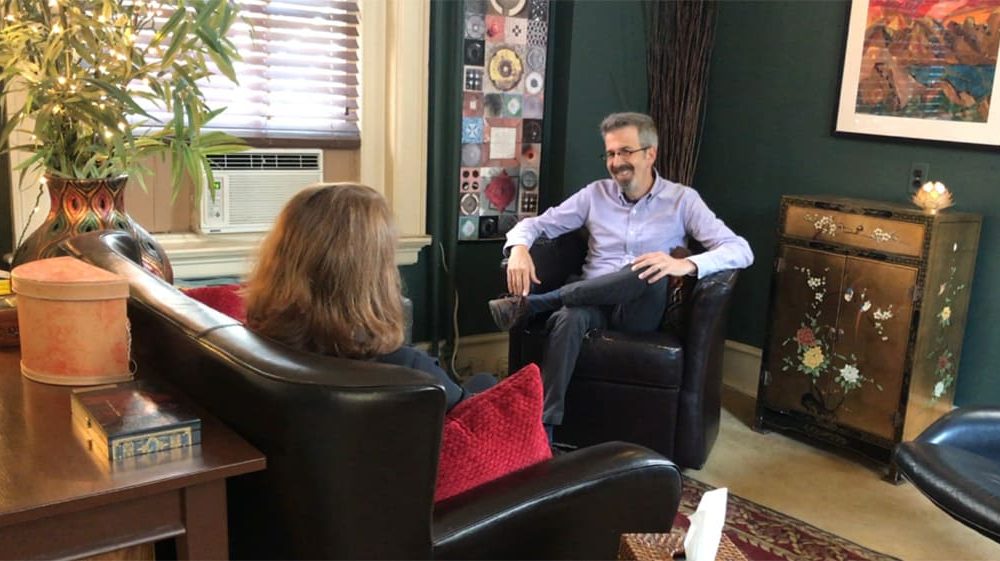
I help people who are experiencing painful emotions–anxiety, depression, anger, shame–whatever the cause. Because emotions can be the signal of the source of problems, by working with the emotions most of the problems that clients present to me can be resolved. This is how I have come to work with such a variety of client issues. People I help include:
- A man with a history of depressive episodes comes to me because he is beginning to isolate—an indication that he may be headed toward another episode
- A woman struggling to decide whether or not to stay in a significant relationship
- A mother who finds herself uncharacteristically angry at her daughter and she’s worried about pushing her daughter away
- A widower in a new relationship discovers that he feels guilty being intimate with his partner because it feels disloyal and this puts the relationship in jeopardy
- A woman who is excessively worried about mild pain and obsesses that she has cancer despite her doctor’s reassurance
 Understanding Emotions. Think of emotions as signals that point us toward things in our life that we need to pay attention to. This can be very routine. Just the right amount of anxiety gets us to finish a memo that’s needed at work. Just the right amount of guilt about an off-hand comment that may have hurt a friend’s feelings can lead us to apologize. But sometimes our emotions become problematic or even overwhelming. This could be because of the loss of someone close to us be it from death, a breakup or a move from a place we love. It could be from work demands that are unrealistic. It could be because we’ve done something that we are ashamed of, but get stuck because we are too afraid to deal with it, so it builds up inside of us. Other times people enter therapy in great distress without even knowing the cause. I’ve seen clients with severe panic attacks that seem like they come out of nowhere. First, we manage the panic attacks to ease their suffering and then we begin to explore the source. Often the underlying issues surface and then we work on how to address the problem.
Understanding Emotions. Think of emotions as signals that point us toward things in our life that we need to pay attention to. This can be very routine. Just the right amount of anxiety gets us to finish a memo that’s needed at work. Just the right amount of guilt about an off-hand comment that may have hurt a friend’s feelings can lead us to apologize. But sometimes our emotions become problematic or even overwhelming. This could be because of the loss of someone close to us be it from death, a breakup or a move from a place we love. It could be from work demands that are unrealistic. It could be because we’ve done something that we are ashamed of, but get stuck because we are too afraid to deal with it, so it builds up inside of us. Other times people enter therapy in great distress without even knowing the cause. I’ve seen clients with severe panic attacks that seem like they come out of nowhere. First, we manage the panic attacks to ease their suffering and then we begin to explore the source. Often the underlying issues surface and then we work on how to address the problem.
 Loss and life transitions. I am especially interested in helping people through times of loss and transitions—and there is no significant loss without transition or transition without some form of loss, even when the transition is positive. For example:
Loss and life transitions. I am especially interested in helping people through times of loss and transitions—and there is no significant loss without transition or transition without some form of loss, even when the transition is positive. For example:
- I see great opportunities in mid-life transitions, often preceded by a crisis or a loss of enthusiasm, work burn-out, or great anxiety including fears related to illness, aging and death.
- I see the “twenty-somethings” who are feeling they are stalled out, or can’t gain footing for their next steps or are disappointed in love or work. Often, they need affirmation of that seed of possibility within themselves.
- I see parents who have lost a child—for many, it is the realization of their greatest fears, and the most devastating period of their lives. I sit with them, having learned to be patient with their grief, and give them a listening ear long after other well-meaning people in their lives believe they should be “moving on”.
- I see an “empty-nester” woman entering school or work after having raised a family, yet she is grieving the loss of the shining years of having all her family together.